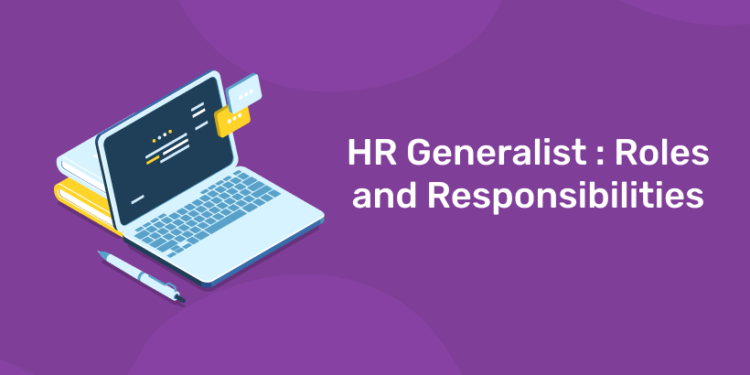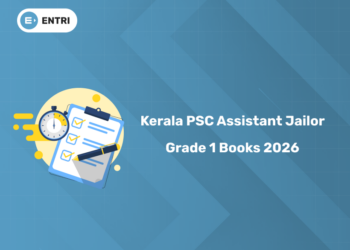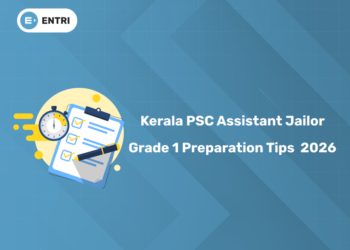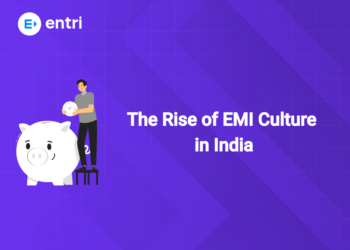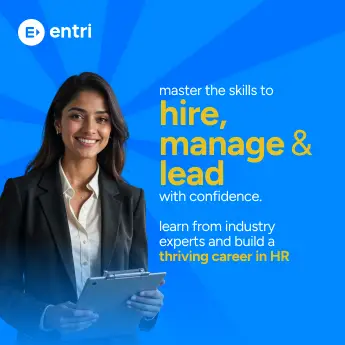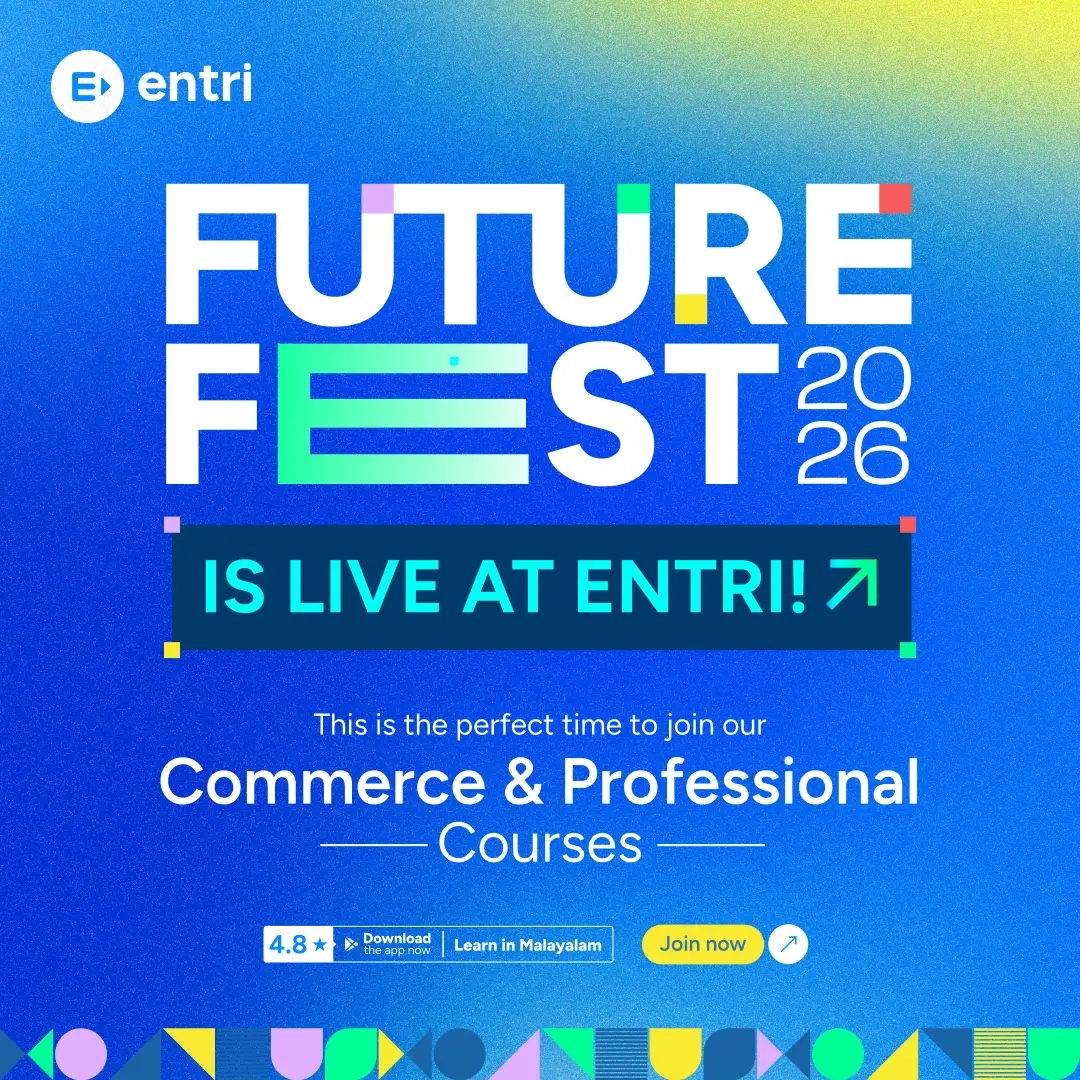Table of Contents
Introduction
In today‘s fast–paced business world, the role of an HR Generalist has become more important than ever. It is the backbone of human resource management and ensures that organisations manage their most valuable asset–their people. An HR Generalist is a jack of all trades HR professional who handles various HR functions from recruitment to employee relations, compliance, and beyond. This post will define what an HR Generalist is, their key responsibilities, strategic roles, key skills, and how aspiring professionals can upskill through courses like the HR Management Course offered by Entri.
Who is an HR Generalist?
HR practitioner with general knowledge and skills in a broad range of HR functions. In contrast to specialization in a specific area such as recruitment or payroll, HR Generalists are generalists who can work for the organisation as a whole. They deal with management and employees, serving as a liaison to communicate, solve conflicts and enforce HR policies.
The versatility of an HR Generalist makes them an essential part of any organization, especially in small to mid-sized companies where they may be the only HR representative. As organizations grow, the demand for HR Generalists continues to increase, making this career path not only rewarding but also more important.
Become an HR Expert – Enroll in Our HR Management Course Today!
Unlock the secrets to effective Human Resource Management with our expert-led course! Learn recruitment, employee relations, performance management, and more to build a thriving workplace. Start your journey toward a successful HR career today!
Know MoreKey Tasks
An HR Generalist manages a broad set of tasks to assist employees and organizational objectives. Their key responsibilities are:
-
Recruitment and Selection
Managing the entire process of hiring, from job postings to interviewing and making candidate offers. -
Onboarding
Assisting new hires through orientation, introducing them to company policies, and integrating them into the workplace culture. -
Employee Relations
Serving as a contact for employees to discuss workplace issues, conflicts, or grievances confidentially. -
Performance Management
Coordinating annual reviews, training managers to provide feedback, and creating plans to address underperformance. -
Training and Development
Identifying skill gaps in teams and coordinating workshops or courses to develop employee competence. -
Compensation and Benefits
Managing payroll activities, administering benefit packages, and ensuring pay equity is aligned with industry standards. -
Policy Development
Creating HR guidelines to address legal requirements and organizational principles and updating procedures as needed. -
Compliance
Ensuring compliance with labor laws, safety procedures, and regulatory requirements to reduce organizational risk. -
Employee Engagement
Creating initiatives such as team-building activities or wellness programs to improve morale and job satisfaction. -
HR Data Management
Maintaining current personnel records and preparing reports to monitor turnover, recruitment metrics, and workforce trends. -
Succession Planning
Working with leaders to identify high-potential employees and develop them for career progression. -
Workforce Strategy
Analyzing staff needs and marketplace trends to position hiring for long-term business plans. -
Conflict Mediation
Resolving differences between coworkers or departments to create a productive work environment. -
Exit Processes
Facilitating offboarding discussions to gain insights from departing employees and minimize future turnover. -
Diversity and Inclusion
Fostering equity through training, policy updates, and campaigns to create a welcoming workplace for all. -
HR Analytics
Measuring the impact of HR initiatives using metrics such as retention rates or training ROI to optimize strategies. -
Job Design
Reviewing jobs to design accurate job descriptions and ensure duties align with organizational needs. -
Organizational Change
Aiding restructuring initiatives, mergers, or process improvement to increase operational effectiveness. -
Workplace Safety
Applying safety protocols and training to meet OSHA standards and avoid accidents. -
Employee Recognition
Enacting award schemes or peer-to-peer recognition schemes to acknowledge staff achievement.
Strategic Roles
Alongside the day-to-day, HR Generalists also have strategic roles to play in connecting HR with the business. Below are 20 strategic roles of an HR Generalist:
-
Strategic Workforce Planning: Collaborating with leadership to plan future workforce needs in line with business goals.
-
Talent Management: Creating talent management plans to hire, retain and develop top performers.
-
Organisational Culture Development: Creating and developing a positive organisational culture in line with business values.
-
Change Management: Driving and enabling change to minimize disruption and gain employee buy-in.
-
Leadership Development: Developing high potential employees for future leadership roles within the business.
-
HR Strategy: Helping to develop HR strategies aligned to the overall business.
-
Employee Experience: Creating employee experiences that drive employee engagement, satisfaction, and retention.
-
Data Driven Decision Making: Using HR data to inform decisions and make HR better.
-
Employer Branding: Creating and developing the business’s employer brand to attract top talent.
-
Compliance: Creating compliance plans to mitigate legal risk and ensure the organisation remains within the law.
-
Crisis Management: Creating crisis management plans to get in front of future HR challenges.
-
Strategic Partnership with Leadership: Being a strategic partner to leadership, offering insight on HR matters that have a bearing on business outcomes.
-
Budgeting and Resource Management: Collaborating with finance to develop HR budgets and resource allocation.
-
Innovation in HR: Researching and applying new HR practices to drive employee engagement and productivity.
-
Stakeholder Management: Working with stakeholders to gain alignment around HR initiatives and business goals.
-
Community Outreach: Acting on behalf of the business in community outreach activities to drive corporate social responsibility.
-
Market Research and Benchmarking: Carrying out market research to remain current with the latest HR trends and benchmark against competitors.
-
Technology: Leveraging HR technology to automate and enhance efficiency.
HR Generalist Skills
Here is the content you provided, formatted in a list:
-
Communication: Verbal and written.
-
Interpersonal: Employee, management and stakeholder relations.
-
Problem Solving: HR issues and conflicts.
-
Organisation: Prioritization and multi-tasking.
-
Analysis: Decision-making and interpretation of data.
-
Attention to Detail: Detail in HR procedures and documentation.
-
Flexibility: Ability to cope with changing workplace and HR trends.
-
Labour Laws: Awareness of labour laws and regulations.
-
HR Software: Familiarity with payroll system and HRIS.
-
Conflict Resolution: Positive employee relations and conflict resolution.
-
Strategic: Strategic thinking ability and HR alignment with business goals.
-
Negotiation: Strong negotiation skills to build debate and agreement among parties.
-
Coaching and Mentoring: Ability to coach and mentor employees for growth.
-
Networking: Ability to build and maintain professional networks to improve HR.
-
Sales and Marketing: Ability to market HR and employer brand.
-
Learning: Commitment to continuous learning and development in HR.
Become an HR Expert – Enroll in Our HR Management Course Today!
Unlock the secrets to effective Human Resource Management with our expert-led course! Learn recruitment, employee relations, performance management, and more to build a thriving workplace. Start your journey toward a successful HR career today!
Know MoreConclusion
An HR Generalist wears numerous hats, numerous hats that are essential to the success of any organization. From recruitment to employee relations to strategic planning to compliance HR Generalists are the backbone of a healthy workplace and organization development.
If you are considering starting or advancing a career in HR, specialized training can be a game changer. Entri provides an HR Management Course in Kerala that provides aspiring HR professionals with the skills and knowledge necessary to succeed in this ever-evolving field. The course covers everything from foundation of HR to advanced strategies so that participants are job ready for the changing HR landscape.
Want to transform your career and get a thorough understanding of HR? Join the HR Management Course by Entri. With practical assignments, faculty led sessions and placement assistance this course is designed to make you HR ready.
More and Enroll now at HR Management Course in Kerala.
Start your journey to become an HR Generalist today!
Become an HR Expert – Enroll in Our HR Management Course Today!
Unlock the secrets to effective Human Resource Management with our expert-led course! Learn recruitment, employee relations, performance management, and more to build a thriving workplace. Start your journey toward a successful HR career today!
Know MoreFrequently Asked Questions
What qualifications are needed to become an HR Generalist?
To become an HR Generalist, a bachelor’s degree in human resources, business administration, or a related field is typically required. Additionally, strong communication skills, problem-solving abilities, and a basic understanding of labor laws are essential. Many employers also prefer candidates with relevant internships or work experience in HR. Certifications such as PHR (Professional in Human Resources) or SHRM-CP (Society for Human Resource Management Certified Professional) can enhance your profile and demonstrate your commitment to the field.
What are the primary responsibilities of an HR Generalist?
HR Generalists are responsible for a wide range of functions, including recruitment and selection, onboarding new employees, managing employee relations, performance management, and compliance with labor laws. They also handle payroll administration, employee engagement initiatives, training and development programs, and policy implementation. Their role is crucial in ensuring that HR processes run smoothly and that employees receive the support they need.
How does the HR Generalist role differ from specialized HR roles?
While HR Generalists have a broad range of responsibilities across multiple HR functions, specialized HR roles focus on specific areas, such as recruitment, compensation, or training. For instance, a recruitment specialist concentrates solely on attracting and hiring talent, while a compensation analyst focuses on salary structures and benefits. HR Generalists, on the other hand, are involved in all aspects of HR, making them versatile and adaptable to various organizational needs.
What skills are essential for an effective HR Generalist?
An effective HR Generalist should possess strong communication and interpersonal skills to interact with employees and management. Problem-solving abilities and analytical thinking are also crucial for addressing employee issues and making informed decisions. Additionally, organizational skills, attention to detail, knowledge of labor laws, and proficiency in HR software are essential. Emotional intelligence is important for understanding and managing workplace dynamics, while adaptability helps HR Generalists navigate changing business environments.
How can I advance my career as an HR Generalist?
Advancing your career as an HR Generalist often involves gaining additional certifications, pursuing specialized training, and seeking opportunities for professional development. Participating in workshops, networking with HR professionals, and staying updated on industry trends can also enhance your career prospects. Consider taking on leadership roles in HR projects or volunteering for cross-functional teams to gain experience. Further education, such as a master’s degree in human resources or business administration, can also open doors to higher-level positions.
What is the significance of HR analytics in the role of an HR Generalist?
HR analytics is crucial for HR Generalists as it involves using data to inform decision-making and improve HR practices. By analyzing metrics related to employee performance, turnover rates, and engagement levels, HR Generalists can identify trends and make data-driven recommendations. This analytical approach helps organizations optimize their HR strategies, enhance employee satisfaction, and ultimately drive business performance.
How does the HR Management Course offered by Entri prepare participants for a career as an HR Generalist?
The HR Management Course at Entri provides comprehensive training in various HR functions, equipping participants with the skills and knowledge necessary for a successful HR career. The course covers foundational HR concepts, compliance with labor laws, performance management, and employee engagement strategies. Through practical assignments, expert-led sessions, and mock interviews, participants gain hands-on experience and are prepared to tackle real-world HR challenges. Additionally, the course offers placement assistance to help graduates secure employment in the field.
Is it possible to pursue the HR Management Course while working full-time?
Yes, the HR Management Course offered by Entri is designed to accommodate working professionals. The course typically features flexible scheduling and online sessions, allowing participants to balance their studies with their job responsibilities. This flexibility enables individuals to enhance their HR knowledge and skills without needing to sacrifice their current employment.
What career opportunities are available for HR Generalists?
HR Generalists can pursue various career paths within human resources, including roles such as HR Executive, Talent Acquisition Specialist, Employee Engagement Officer, Payroll Executive, and HR Analyst. With experience, they may advance to senior positions such as HR Manager, HR Business Partner, or Director of Human Resources. The versatility of the HR Generalist role also opens opportunities in specialized areas like training and development, compliance, and organizational development.
How does the HR Management Course help with networking and industry connections?
The HR Management Course at Entri promotes networking opportunities by connecting participants with industry professionals and peers. Through interactive sessions, group projects, and discussions, participants can build relationships with fellow students and instructors, facilitating knowledge sharing and collaboration. Additionally, the course often includes guest speakers from the HR field, providing insights and connections that can be valuable for future career opportunities. Networking is a crucial aspect of career development in HR, and Entri supports this through its educational offerings.


